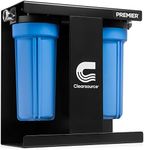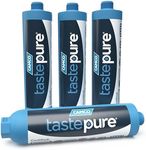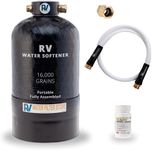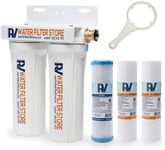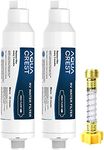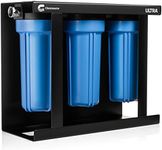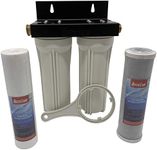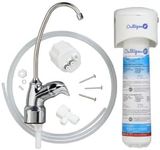Buying Guide for the Best Rv Water Filters
Choosing the right RV water filter is important for ensuring you have clean, safe, and good-tasting water while traveling. The best filter for you depends on your travel habits, the water sources you encounter, and your personal preferences for convenience and maintenance. Understanding the key features and specifications will help you make a confident choice that matches your needs.Filtration TypeFiltration type refers to the method the filter uses to clean the water, such as sediment, carbon, or multi-stage filtration. This is important because different types remove different contaminants. Sediment filters are good for removing dirt and particles, carbon filters help with taste and odor, and multi-stage filters combine several methods for broader protection. If you often camp in areas with questionable water quality, a multi-stage filter is a good choice. For mostly city water, a simple carbon filter may be enough.
Micron RatingThe micron rating tells you the size of particles the filter can remove, measured in microns. A lower number means the filter can catch smaller particles. Filters with a 1-5 micron rating are good for removing most sediments and some bacteria, while higher ratings (10 microns or more) are better for just basic sediment. If you want cleaner, safer water, look for a lower micron rating, but remember that very fine filters may need to be replaced more often.
Flow RateFlow rate is how much water can pass through the filter in a given time, usually measured in gallons per minute (GPM). This matters because a low flow rate can slow down your water supply, making showers and filling tanks take longer. If you have a larger RV or use water for multiple tasks at once, look for a higher flow rate. For smaller RVs or single-use, a lower flow rate may be fine and can sometimes mean better filtration.
Filter LifespanFilter lifespan tells you how long the filter will last before it needs to be replaced, usually measured in gallons or months. This is important for convenience and ongoing costs. If you travel often or use a lot of water, a longer lifespan means less frequent changes. If you only use your RV occasionally, a shorter lifespan may be acceptable. Always consider your travel frequency and water usage when choosing.
Installation TypeInstallation type refers to how and where the filter is set up, such as inline (attaches to the hose), canister (mounted inside the RV), or portable. This affects convenience and space. Inline filters are easy to use and require no permanent installation, making them great for beginners or renters. Canister systems are more permanent and can offer better filtration, but need more space and installation effort. Choose based on your comfort with installation and how much space you have.
Contaminant RemovalContaminant removal describes what the filter is designed to remove, such as chlorine, bacteria, heavy metals, or bad tastes and odors. This is important for health and comfort. If you travel to areas with known water issues, look for filters that specifically mention removing those contaminants. For general use, a filter that handles chlorine and sediment is usually enough. Always match the filter’s capabilities to the water sources you expect to use.
